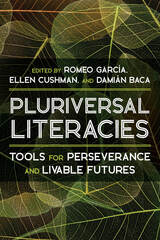
A Global Analysis of Sites, Practices, and Processes of Decolonial and Indigenous Meaning-Making
Decolonial projects can end up reinforcing dominant modes of thinking by shoehorning understandings of Indigenous and non-Western traditions within Eurocentric frameworks. The pluralization of literacies and the creation of so-called alternative rhetorics accepts that there is a totalizing reality of rhetoric and literacy. This volume seeks to decenter these theories and to engage Indigenous contexts on their own terms, starting with the very tools of representation. Language itself can disrupt normative structures and create pluriversal possibilities. The volume editors and contributors argue for epistemic change at the level of the language and media that people use to represent meaning. The range of topics covered includes American Indian and Indigenous representations, literacies, and rhetorics; critical revisionist historiography and comparative rhetorics; delinking colonial literacies of cartographic power and modernity; “northern” and “southern” hemispheric relations; and theorizations of/from oceanic border spaces.

Disruptive pedagogies for archival research
In a cultural moment when institutional repositories carry valuable secrets to the present and past, this collection argues for the critical, intellectual, and social value of archival instruction. Graban and Hayden and 37 other contributors examine how undergraduate and graduate courses in rhetoric, history, community literacy, and professional writing can successfully engage students in archival research in its many forms, and successfully model mutually beneficial relationships between archivists, instructors, and community organizations.
Combining new and established voices from related fields, each of the book’s three sections includes a range of form-disrupting pedagogies. Section I focuses on how approaching the archive primarily as text fosters habits of mind essential for creating and using archives, for critiquing or inventing knowledge-making practices, and for being good stewards of private and public collections. Section II argues for conducting archival projects as collaboration through experiential learning and for developing a preservationist consciousness through disciplined research. Section III details praxis for revealing, critiquing, and intervening in historic racial omissions and gaps in the archives in which we all work.
Ultimately, contributors explore archives as sites of activism while also raising important questions that persist in rhetoric and composition scholarship, such as how to decolonize research methodologies, how to conduct teaching and research that promote social justice, and how to shift archival consciousness toward more engaged notions of democracy. This collection highlights innovative classroom and curricular course models for teaching with and through the archives in rhetoric and composition and beyond.
READERS
Browse our collection.
PUBLISHERS
See BiblioVault's publisher services.
STUDENT SERVICES
Files for college accessibility offices.
UChicago Accessibility Resources
home | accessibility | search | about | contact us
BiblioVault ® 2001 - 2024
The University of Chicago Press









